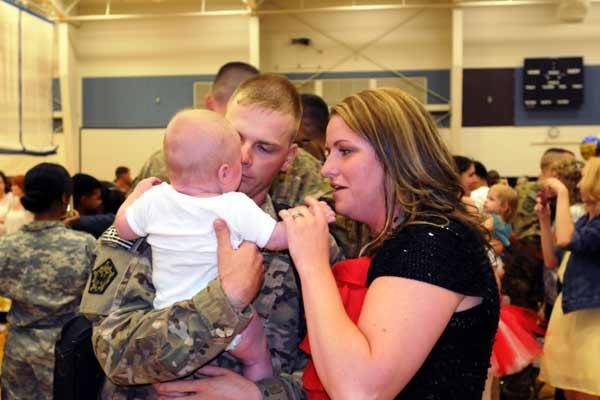Army families have started to shift their focus of coping with multiple deployments to the promise of the high deployment tempo finally slowing down as the U.S. withdraws forces from Afghanistan.
Similarly, the Army has started to adapt their approach to resiliency training by helping families deal with the long-term effects of serving multiple deployments.
"The bow wave of need is still coming" for troop counseling and guidance as the war in Afghanistan winds down, deployments scale back and defense budgets shrink, said Army Lt. Gen. Mike Ferriter, the Army's assistant chief of staff for Installation Management.
Ferriter stressed that "those programs are out there" to meet the mental health needs of military families. "At every installation, we have the resources," Ferriter said.
But Lt. Gen. William Ingram, Jr., the director of the Army National Guard, said the availability of programs won't matter unless the Army's leadership finally removes the stigma attached to soldiers and their spouses who seek help.
"We've got to build a command climate that says it's okay to need help" to build the resilience for dealing with life in the military, Ingram said at a military family forum sponsored by the Association of the U.S. Army Tuesday.
Several spouses at the forum spoke about the stuggle to cope with the stress of having their husband or wife return home, after years of becoming accustomed to the stress of repeat deployments.
"I had to learn how to release my role as two parents," said Melissa Seligman, whose husband, Capt. David Seligman, deployed three times to Iraq and Afghanistan.
Seligman said she almost became inured to the fear of waiting for the phone call in the middle of the night, or the dreaded knock on the door. With her husband home at Fort Jackson, she explained how she had to focus on "sustaining life rather than avoiding death."
"I knew he'd come back and we've have this vast canyon of silence," Seligman said. "He did come home. He was changed. I heard his stories about the bombs and the blood," she said, but she'd heard those stories many times before.
"I just wanted to get back to the point where we were us again," she said. "It's traumatic waiting for someone to come home from war," and it's traumatic when they finally arrive.
"There is no clear path forward when we've been at war so long," she said.
To seek help, "it was a matter of becoming unafraid," Seligman said. With the help of a friend, she found help through MilitaryOneSouce.com. The Army has stressed the "re-integration" of the soldier to stateside service, but Seligman said that seeking help "began a new re-integration for me."
Jill Sanders Crider said that she went through similar experiendes as an Army wife in feeling angry and withdrawn – and not knowing why.
"Something would happen and I'd be dealing with it, with the emotions from two years ago, and you kind of stay on a low boil," she said. "That's why things send you to the roof."
Learning to handle the stress "is really a building process," Crider said. "It's building resiliency every day. And some days I'm good at it, some days I'm not," she said.
Wayne Perry went through an entirely difference experience as an Army husband whose wife deployed to Iraq, but "I have been on that ledge in my own way."
About five percent of Army marriages have husbands as the civilian, Perry said, but those marriages also make up about 34 percent of the divorces.
Too often, husbands of deployed wives are left out of family support groups, and "we need to find a way for us guys to have a community of our own" for mental health assistance, Perry said. "We're just kind of left out there."
Heather Sweeney and Ward Carroll contributed to this article.





























